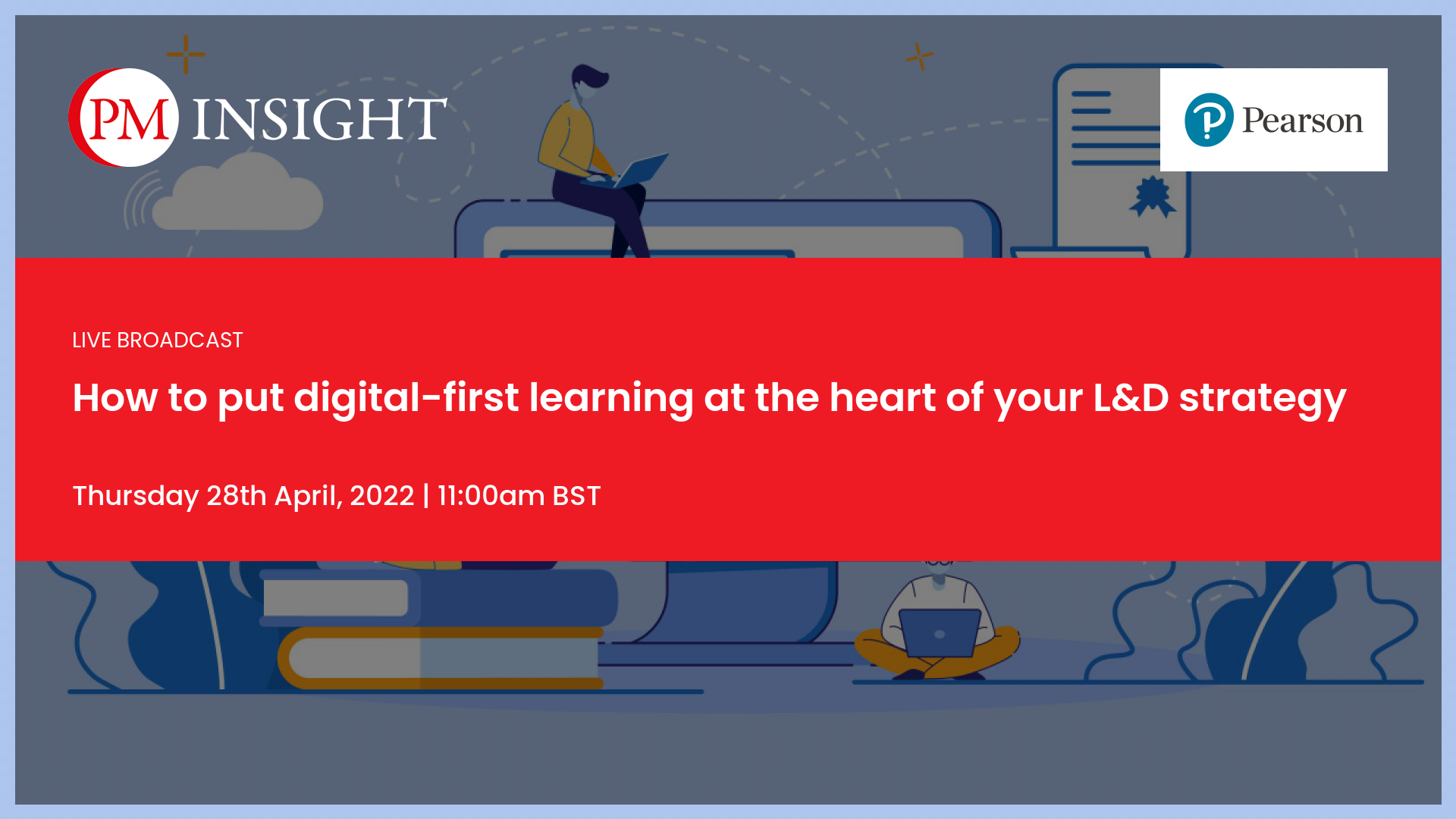
A revolution in learning and development has taken place over the last two years. Innovative ways of delivering educational content have not only produced new opportunities for organisations to invest in their people, but also developed an enthusiastic generation of employees, eager to learn in bespoke ways.
Focusing on a digital-first strategy will allow this learning revolution to continue and exceed employee expectations, with e-learning that surprises and delights – whether your staff are interested in apprenticeships, bite-sized courses, industry accreditations or degree-level and Masters qualifications.
In this PM Insight webinar, in association with Pearson Online Learning Services, our panel will draw on the following key insights from its recent survey to discuss the future of e-learning and why it will be central to solving business challenges of the future:
Talent retention – 70% of organisations are focusing on reskilling/upskilling
Organisations are increasingly looking inward to develop their existing employees to help solve the talent crisis. How will upskilling help to encourage an engaged and productive workforce?
Delivery methods – 74% believe the pandemic “has been a catalyst for a long-overdue learning innovation”
How have innovative digital-first L&D methods – such as peer-to-peer learning and gamification – opened up new paths for different skills and qualifications, from short courses to degree-level learning?
Self-directed learning – 64% of employees have shown an increased appetite for continuous professional development (CPD)
Awareness of the importance of CPD is growing and doing nothing is not an option for businesses that want to keep their workforce happy. How can self-directed learning help and what are the options to encourage further education outside of work hours?
Business strategy – 34% intend to invest in transformation technology
In light of the pandemic, leadership and management training is top of the agenda (with 71 mentions across all respondents in the survey) – but how can organisations build a more strategic workforce through L&D, which aligns directly with business objectives? For example, through project-based learning.
Managing budgets – 78% have an L&D spend of under 500k
Today’s businesses have to make the most of their budgets. So what should be included in L&D programmes to answer the needs of all employees, and how can introducing new paths, such as Masters degrees, feed your star talent pipeline?
Loading feed
An error occurred trying to play the stream. Please reload the page and try again.
Close
Benjamin Stein is the Director, Product & Portfolio for Pearson’s International Online Services team, where he leads product strategy and portfolio diversification initiatives focusing on adult online learners. Ben has spent his career supporting learning institutions with services and technology at Blackboard, Hobsons and at an ed tech start-up. Ben lives in London with his wife and four boys.

Parysa is experienced in transformational change and passionate about developing talent while making working life fun, motivating and exciting.
Working closely with executive teams, she places innovation and engagement at the heart of people management strategy.
With over a decade of experience at business communications specialist Onecom, where the organisation has grown to over 600 employees through organic growth and multiple acquisitions, Parysa has focused on turning people strategy into tangible commercial results.
She led the development of an award-winning leadership development programme as part of a wider focus on talent development through multiple routes including upskilling, recruitment, apprenticeships, and mentoring.
Parysa introduced Onecom’s Agile Working Policy, as well as comprehensive schemes to support employee health and wellbeing. These initiatives proved especially valuable during the pandemic, and are now established as the business embraces a mix of workplace and remote working.
Parysa was also instrumental in Onecom reaching Gold Standard accreditation from Investors in People in 2020 with a score in the top 3% of UK businesses.

Matthew is a Training Capability – Learning, Digital Development, Academic Lead operating in a central role for Babcock International.
He is leading the way in adapting trainers capabilities to promote blended learning solutions within the learning environment, utilising Adaptive Learning & Teaching methodologies to promote trainees needs.

Steve manages the digital learning portfolio in HR and Employment Law for the CIPD (the professional body for all those in HR and Learning & Development) having spent much of his career prior to this as a consultant working on digital learning for some of the world's leading brands. Steve is passionate about the role of the ‘people profession’, and the potential for digital learning to increase access to opportunity for people around the world. He is an Associate of the CIPD, a Fellow of the Royal Society of Arts and a graduate member of the British Psychological Society.



